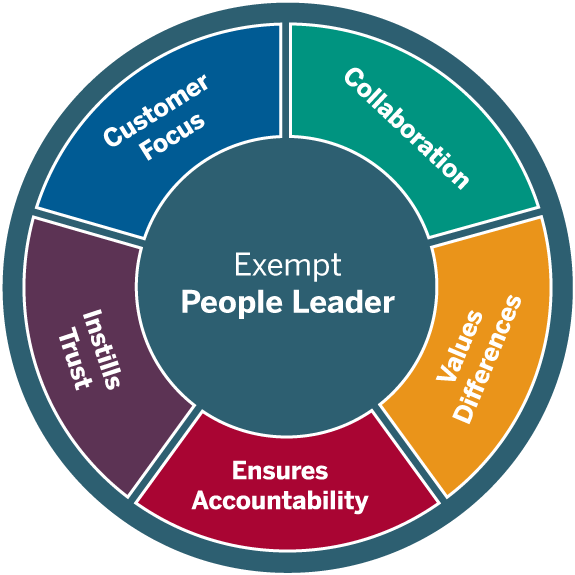Exempt People Leader: Operational
Communicates Effectively
Developing and delivering multi-mode communications that convey a clear understanding of the unique needs of different audiences
Good communication results in mutual understanding, harmony, and action. Poor communication wastes time and resources, hinders goal accomplishment, and sours relationships. Effective communication—whether written or verbal—enables you to convey your vision, to point the way forward, and to energize others to work together and pull in the same direction.
You show this competency when you:
- Are effective in a variety of communication settings: one-on-one, small and large groups, or among diverse styles and position levels
- Attentively listen to others
- Adjust to fit the audience and the message
- Provide timely and helpful information to others across the organization
- Encourage the open expression of diverse ideas and opinions
How to develop this competency:
Adjust your message
One presentation or document generally does not play equally well across differing audiences. Whether you are writing or speaking you will have to adjust the length, tone, pace, style, and even the message—and how you couch it to different audiences. Adjust the information to the needs of the audience.
Acknowledge emotions
Emotional conversations are the most difficult. Don’t make the mistake of ignoring or avoiding emotions. Start by asking questions of yourself- What is it about this conversation that makes it difficult for you? What emotions or worries does it create for you? What emotional reactions might the other person or group have? Once you have acknowledged this, it will be easier to think about what information you need to communicate and the best way to do it.
Solicit input and discussion
Effective communicators see the value in different perspectives. They listen to others, brainstorm ideas, and collaborate on plans. They—even as leaders—are open to what they can learn. To improve as a communicator, set aside the need to know it all. Ask what others can contribute. Welcome divergent views. Put yourself in learning mode. Even when ideas conflict, new and better solutions can emerge.
Learn more:
- Article: Effortless Communication, A White Paper by Deborah Keep
- Book: The Coaching Habit: Say Less, Ask More and Change the Way You Lead Forever by Michael Bungay Stinger
- Video: TED: The Importance of Emotional Tone in the Digital Age
- Video: TED: How to Train Employees to Have Difficult Conversations
- LinkedIn Learning: Communicates Effectively course collection

Exempt People Leader
- Direct Works
- Communicates Effectively
- Drives Engagement
- Manages Conflict
- Develops Talent
- Strategic Mindset
Operational
Sr. Operational
Strategic
